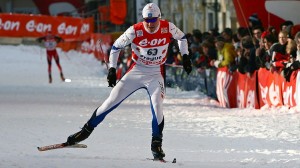VANCOUVER, Canada — The past couple of days have seen more of two things that have become synonymous with Vancouver 2010 — bad weather and drug scandals.
Snow, snow go away
For the second time in the opening week the alpine skiing schedule has been interrupted by heavy snow. Last week event organizers could not buy enough snow, now it seems they have too much of a good thing. This time it has been the [private_supervisor]men’s downhill super combined and giant slalom which have had to be postponed, affecting Latvian Roberts Rode, who was due to compete in both disciplines. It is now hoped the events can take place on Sunday.

Kasper Kokk's high hemoglobin levels resulted in the ban; it's unclear if he was using a performance-enhancing drug or not.
Estonian’s potential drug use scrutinized
Along with skiers Kasper Kokk of Estonia and Niyaz Nabeev of Russia has been handed a five-day competition ban for recording abnormally high hemoglobin levels in a pre-games drug test, performed on 304 individual athletes.
High hemoglobin levels can occur naturally, but can also be a sign of performance-enhancing drugs. The more likely cause is the first, with the levels occurring when someone become dehydrated, especially when trying to adapt to higher altitudes. Erythropoietin is the drug employed in the latter cause. Athletes would take the drug if they intended to promote the development of red blood cells to assist their breathing at high altitude.
The suspension has seen Kokk already miss his opening event, but he will be eligible for further events on the cross-country schedule later in the games. The fact that the diagnosis can occur naturally shows the measures to which the International Olympic Committee are going to in an effort to stamp out drug cheats.[/private_supervisor] [private_subscription 1 month]
men’s downhill super combined and giant slalom which have had to be postponed, affecting Latvian Roberts Rode, who was due to compete in both disciplines. It is now hoped the events can take place on Sunday.

Kasper Kokk's high hemoglobin levels resulted in the ban; it's unclear if he was using a performance-enhancing drug or not.
Estonian’s potential drug use scrutinized
Along with skiers Kasper Kokk of Estonia and Niyaz Nabeev of Russia has been handed a five-day competition ban for recording abnormally high hemoglobin levels in a pre-games drug test, performed on 304 individual athletes.
High hemoglobin levels can occur naturally, but can also be a sign of performance-enhancing drugs. The more likely cause is the first, with the levels occurring when someone become dehydrated, especially when trying to adapt to higher altitudes. Erythropoietin is the drug employed in the latter cause. Athletes would take the drug if they intended to promote the development of red blood cells to assist their breathing at high altitude.
The suspension has seen Kokk already miss his opening event, but he will be eligible for further events on the cross-country schedule later in the games. The fact that the diagnosis can occur naturally shows the measures to which the International Olympic Committee are going to in an effort to stamp out drug cheats.[/private_subscription 1 month] [private_subscription 4 months]men’s downhill super combined and giant slalom which have had to be postponed, affecting Latvian Roberts Rode, who was due to compete in both disciplines. It is now hoped the events can take place on Sunday.

Kasper Kokk's high hemoglobin levels resulted in the ban; it's unclear if he was using a performance-enhancing drug or not.
Estonian’s potential drug use scrutinized
Along with skiers Kasper Kokk of Estonia and Niyaz Nabeev of Russia has been handed a five-day competition ban for recording abnormally high hemoglobin levels in a pre-games drug test, performed on 304 individual athletes.
High hemoglobin levels can occur naturally, but can also be a sign of performance-enhancing drugs. The more likely cause is the first, with the levels occurring when someone become dehydrated, especially when trying to adapt to higher altitudes. Erythropoietin is the drug employed in the latter cause. Athletes would take the drug if they intended to promote the development of red blood cells to assist their breathing at high altitude.
The suspension has seen Kokk already miss his opening event, but he will be eligible for further events on the cross-country schedule later in the games. The fact that the diagnosis can occur naturally shows the measures to which the International Olympic Committee are going to in an effort to stamp out drug cheats.[/private_subscription 4 months] [private_subscription 1 year]men’s downhill super combined and giant slalom which have had to be postponed, affecting Latvian Roberts Rode, who was due to compete in both disciplines. It is now hoped the events can take place on Sunday.

Kasper Kokk's high hemoglobin levels resulted in the ban; it's unclear if he was using a performance-enhancing drug or not.
Estonian’s potential drug use scrutinized
Along with skiers Kasper Kokk of Estonia and Niyaz Nabeev of Russia has been handed a five-day competition ban for recording abnormally high hemoglobin levels in a pre-games drug test, performed on 304 individual athletes.
High hemoglobin levels can occur naturally, but can also be a sign of performance-enhancing drugs. The more likely cause is the first, with the levels occurring when someone become dehydrated, especially when trying to adapt to higher altitudes. Erythropoietin is the drug employed in the latter cause. Athletes would take the drug if they intended to promote the development of red blood cells to assist their breathing at high altitude.
The suspension has seen Kokk already miss his opening event, but he will be eligible for further events on the cross-country schedule later in the games. The fact that the diagnosis can occur naturally shows the measures to which the International Olympic Committee are going to in an effort to stamp out drug cheats.[/private_subscription 1 year]
— This is a paid article. To subscribe or extend your subscription, click here.












